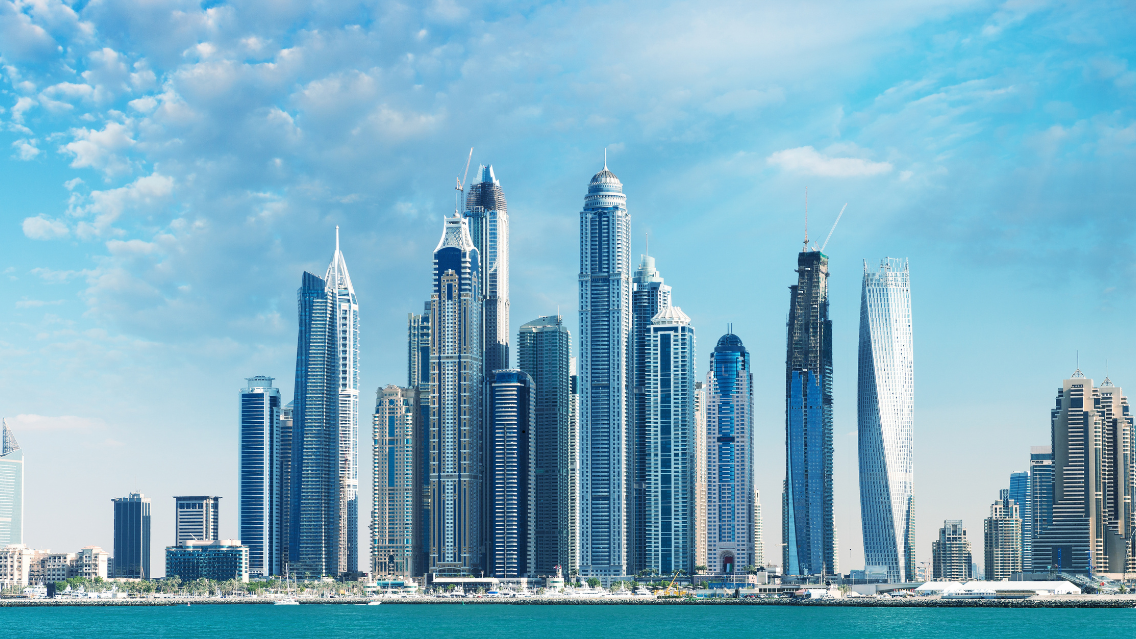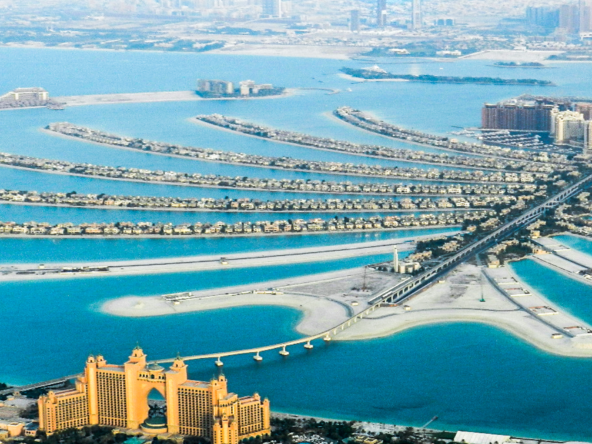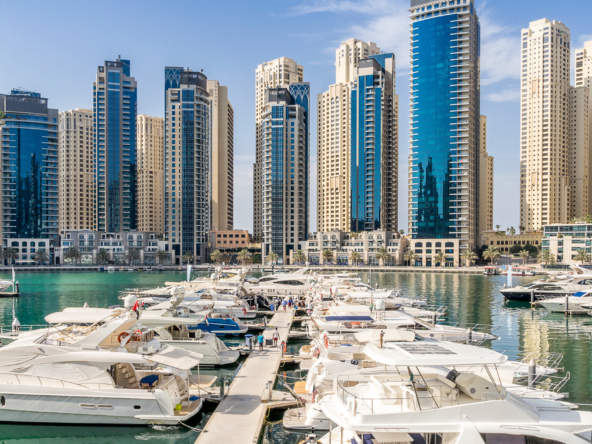Introduction
Dubai has long been a pioneer in visionary projects, transforming from a desert city to a global hub of innovation, luxury, and commerce. At the heart of this transformation is the city’s ambitious Smart City Vision—a bold initiative that integrates cutting-edge technologies to improve the quality of life for residents and enhance business opportunities. One of the sectors most significantly impacted by this vision is real estate. Dubai’s quest to become one of the smartest cities in the world has led to a wave of innovations that are reshaping how properties are built, managed, and lived in.
This blog will explore how Dubai’s technological advancements—ranging from artificial intelligence (AI) and the Internet of Things (IoT) to blockchain and sustainable solutions—are influencing its real estate landscape. For investors, understanding these changes is key to tapping into new opportunities and capitalizing on Dubai’s smart city ambitions.
1. Dubai’s Smart City Vision: An Overview
Dubai’s Smart City Vision was officially launched in 2013, with a focus on transforming the city through the adoption of modern technologies across all sectors, including governance, transportation, healthcare, energy, and real estate. The initiative is centered around three pillars:
1. Communication: Seamless connectivity and integration across all services.
2. Efficiency: Enhancing sustainability and energy efficiency in urban infrastructure.
3. Livability: Improving the overall quality of life by making the city more comfortable, safe, and efficient.
At the core of this vision is the commitment to using technology to make everyday living smarter and more efficient. The Dubai 2040 Urban Master Plan, announced in 2021, further emphasises this goal, aiming to increase the size of green spaces, build smart infrastructure, and improve the standard of living in all areas of the city.
2. Technological Advancements Impacting Real Estate in Dubai
1. Artificial Intelligence (AI) and Automation in Real Estate Development
AI is one of the driving forces behind Dubai’s smart city transformation, particularly in real estate. AI-powered tools are being used to enhance construction processes, optimize building designs, and even predict market trends. AI in real estate development is making it possible to create properties that are more energy-efficient, sustainable, and suited to the needs of future residents.
For instance:
- Smart building systems use AI to manage energy consumption, security, and maintenance, significantly reducing operational costs and carbon footprints.
- AI-driven market analytics are helping investors make more informed decisions by predicting property values and rental yields, ensuring profitable investments.
2. The Internet of Things (IoT): Enhancing Living Standards
The integration of the Internet of Things (IoT) in Dubai’s real estate is rapidly enhancing the quality of life for residents. IoT connects everyday devices to the internet, allowing them to communicate with each other and be controlled remotely. In smart homes and buildings across Dubai, IoT enables the automation of various systems, from lighting and HVAC to security and entertainment.
Some examples of IoT in Dubai’s real estate include:
- Smart Thermostats: These devices adjust temperature settings based on the user’s preferences or in response to weather conditions, leading to energy savings.
- Smart Security Systems: IoT-enabled security systems can monitor and control building access, detect intrusions, and notify homeowners or building management in real-time.
- Energy Management Systems: Sensors monitor and optimize energy consumption in buildings, reducing utility bills and improving sustainability.
One iconic example is The Sustainable City in Dubai, where IoT-enabled homes offer a range of features that promote energy efficiency, comfort, and safety. The development is a model for sustainable living, incorporating renewable energy sources, efficient waste management, and smart water usage systems, all powered by IoT.
3. Blockchain for Secure Real Estate Transactions
Blockchain technology is another game changer in Dubai’s real estate sector. Known for its ability to offer transparency, security, and efficiency, blockchain is transforming how property transactions are conducted in the city. The Dubai Land Department (DLD) has already adopted blockchain technology to create a fully digital property registry, enabling buyers and sellers to execute transactions securely and efficiently without the need for third-party
intermediaries.
Key benefits of blockchain in real estate include:
- Speed and Efficiency: Blockchain significantly reduces the time taken for property transactions, cutting down on paperwork and manual processes.
- Security: Blockchain provides a tamper-proof ledger of property ownership, ensuring that records are accurate and cannot be altered without authorization.
- Cost Savings: By eliminating intermediaries such as brokers and lawyers, block chain reduces transaction fees, making property deals more cost-effective.
For investors, blockchain offers peace of mind, ensuring that every transaction is secure and traceable. It also opens the door to new investment opportunities, such as tokenized real estate, where properties can be fractionally owned and traded on blockchain platforms.
4. Smart Infrastructure and Urban Planning
Dubai’s Smart City Vision extends beyond individual buildings to encompass entire smart neighborhoods and urban infrastructure. The city’s planners are leveraging geospatial technology, AI, and data analytics to optimize city layouts, improve transportation, and ensure sustainable development.
A prime example is the Dubai Silicon Oasis (DSO), a fully integrated smart city that offers residents and businesses access to cutting-edge technologies, smart infrastructure, and sustainable living solutions. The development includes:
- Smart traffic management systems that use AI to reduce congestion and improve public transport.
- Green building designs that incorporate solar power, energy-efficient systems, and sustainable materials.
- Smart utilities that allow residents to monitor their water and energy consumption in real-time.
As Dubai expands, smart infrastructure will play a critical role in shaping new real estate developments, ensuring they are sustainable, efficient, and capable of meeting the demands of a tech-savvy population.
3. The Role of Sustainability in Smart City Developments
Sustainability is at the heart of Dubai’s smart city agenda, with the goal of reducing carbon emissions and promoting environmental conservation. Real estate developers in Dubai are increasingly adopting green building practices and sustainable technologies, in line with global trends and regulations.
Key sustainability initiatives include:
- Green Building Codes: The Dubai government has implemented strict building codes, mandating the use of sustainable materials, energy-efficient designs, and renewable energy sources. The Al Sa’fat initiative is a green building rating system that ensures new developments adhere to these codes.
- Renewable Energy Integration: Smart buildings are increasingly powered by renewable energy, particularly solar power. For example, The Sustainable City generates most of its energy from solar panels, while Dubai South aims to be a carbonneutral community.
- Water Conservation: Smart water management systems use IoT and AI to reduce water consumption, essential in a desert climate like Dubai’s. Greywater recycling and smart irrigation systems are being incorporated into new developments.
These sustainability-focused initiatives not only reduce the environmental impact of real estate projects but also increase their value for investors, as eco-friendly properties are in high demand.
4. Opportunities for Investors in Smart City Real Estate
Dubai’s transformation into a smart city is creating significant opportunities for real estate investors. The combination of advanced technologies, sustainable living solutions, and government support makes smart city real estate an attractive investment.
1. Increased Property Value
Properties in smart developments tend to appreciate faster due to the high demand for techenabled living spaces. Smart buildings, equipped with energy-efficient systems and IoT features, attract premium buyers and renters, making them a valuable addition to an investment portfolio.
2. Higher Rental Yields
Smart homes and offices are increasingly sought after by tech-savvy tenants, leading to higher rental yields for investors. Areas like Dubai Marina, Downtown Dubai, and Dubai Silicon Oasis are experiencing increased demand for smart properties, which offer convenience, security, and sustainability.
3. Sustainable Investment
Investing in smart, sustainable real estate is not only good for the environment but also offers long-term financial benefits. Properties with green certifications, energy-efficient systems, and sustainable designs tend to have lower operating costs, making them more attractive to both buyers and renters.
4. Future-Proofing Investments
As technology continues to advance, smart properties are well-positioned for the future. With the growing focus on smart infrastructure and sustainability, traditional properties may struggle to keep up, while smart homes will remain at the forefront of the market.
5. Challenges and Considerations
While investing in smart city real estate presents numerous opportunities, it also comes with challenges that investors need to consider:
- Technological Obsolescence: As technology evolves, smart systems may become outdated quickly. Investors should ensure that their properties are equipped with upgradable and scalable solutions to avoid obsolescence.
- Initial Costs: Smart homes and buildings often come with higher upfront costs due to the integration of advanced technologies. Investors must weigh these costs against the potential long-term savings and increased property value.
- Regulatory Compliance: Staying up-to-date with Dubai’s evolving smart city regulations and building codes is crucial for investors, especially in terms of sustainability and tech integration.
Conclusion: The Future of Smart City Real Estate in Dubai
Dubai’s Smart City Vision is reshaping the future of real estate, offering a glimpse into what the cities of tomorrow will look like. With advanced technologies such as AI, IoT, and blockchain driving innovation, smart properties are becoming the new standard in the market. For investors, these technological advancements present significant opportunities to capitalize on Dubai’s transformation, offering increased property values, higher rental yields, and sustainable investment options.
As the city continues to evolve, staying informed about smart real estate trends will be key to making profitable and future-proof investments. In Dubai, the future is not just smart—it’s already here.




